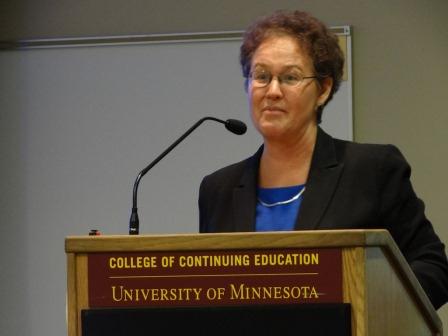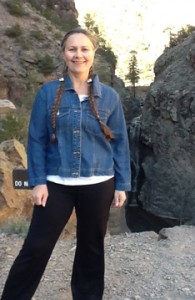 Lois Vosika-Weir, alumna of the CEHD TRiO Upward Bound program, has been recognized with a 2013 national TRiO Achiever Award. Vosika-Weir participated in Upward Bound from 1974 to 1977.
Lois Vosika-Weir, alumna of the CEHD TRiO Upward Bound program, has been recognized with a 2013 national TRiO Achiever Award. Vosika-Weir participated in Upward Bound from 1974 to 1977.
Vosika-Weir, nominated by long-time directors of the University’s TRiO programs Bruce and Sharyn Schelske, started in Upward Bound as a 9th-grader. In her award nomination statement, Vosika-Weir said Upward Bound was the catalyst for ending the cycle of poverty in her life. When she became pregnant in high school, she said the staff continued to have faith in her.
“The staff was different than other people that I had met before,” said Vosika-Weir. “They didn’t believe that because I was poor and now pregnant that I couldn’t achieve.”
Vosika-Weir began her studies in the University’s General College and earned a degree in psychology, youth studies, and chemical dependency. She completed a master’s degree in counseling psychology from Saint Mary’s University and was licensed as a psychologist. She pursued her interest in working in schools and earned a special education teacher’s license from the University of St. Thomas and a school administrator’s license from Hamline University. Vosika-Weir is currently an assistant principal at the American Indian Magnet School in St. Paul.
“Upward Bound gave me a vision for the students that I work with today,” she said. “When I was the administrator for a school for pregnant and parenting teen moms, I worked with young ladies who faced similar obstacles to education as I once did.”
The TRiO Achiever Award is given to five TRiO alumni annually. There are 2,500 TRiO programs nationally with more than 800,000 participants each year.
STEM Education Center Researchers at the 120th ASEE Annual Conference and Exposition
The American Society of Engineering Education (ASEE) held annual conference in Atlanta, Georgia this year. Professors Tamara Moore and Karl Smith, the center Co-Directors, Dr. Jia-Ling Lin, Research Scientist, Kristina Tank, Aran Glancy, and Forster Ntow, graduate students, and Kelly Valusek, the manager from the STEM Education attended the conference, joining thousands of engineering education researchers and educators from the US and all over the world. Researchers from the STEM Education Center presented papers in several sessions:
- Tamara Moore, “The Status of Engineering in the Current K-12 Science Standards (Research to Practice)”, (Moore, Tank, Glancy, Kersten, Ntow). In Session: Engineering in K-12 Science and Mathematics Standards
- Jia-Ling Lin, “Introducing an Instructional Model for Undergraduate Electric Energy Systems Curriculum”, (Lin, Moore, & Imbertson). In Session: New Trends in ECE Education.
- NSF Grantees’ Poster Session- “A Framework for Implementing Quality K-12 Engineering Education”, (Moore, Glancy, Tank, Kersten, Stohlmann, Ntow, & Smith).
- Karl Smith, speaker in Special Session: Connecting and Expanding the Engineering Education Research and Innovation Communities. (Smith & Streveler)
- Moore & Tank, “PictureSTEM Project: A Curricular Approach Using Picture Books to Transform STEM Learning in Elementary Classrooms”. (Moore, Tank, & Pettis). In Session: Curriculum Exchange Wrapup
Other highlights:
- Prof. Tamara Moore and graduate students, Kristina Tank, Aran Glancy, and Forster Ntow conducted the 10th ASEE Workshop on K-12 Engineering Education on June 22 and the NSF-supported STEM Smart workshop on June 23;
- Ms Kelly Valusek led the participation in the Exhibition of “Engineering Education Research”
CEHD ties to China highlighted as part of University delegation
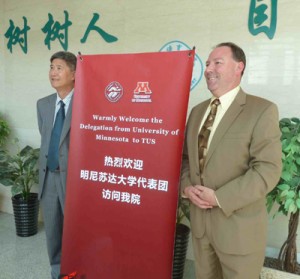 In a University of Minnesota delegation to China led by President Eric Kaler June 25-July 5, programs and alumni of College of Education and Human Development were highlighted, relationships strengthened, and opportunities explored. The trip coincided with the 100th anniversary of the arrival of the first Chinese students to the U of M-Twin Cities.
In a University of Minnesota delegation to China led by President Eric Kaler June 25-July 5, programs and alumni of College of Education and Human Development were highlighted, relationships strengthened, and opportunities explored. The trip coincided with the 100th anniversary of the arrival of the first Chinese students to the U of M-Twin Cities.
CEHD representatives in the delegation (see photo) were Ken Bartlett, professor and associate dean for graduate, professional, and international programs, and Li Li Ji, professor and director of the School of Kinesiology and the Laboratory of Physiological Hygiene and Exercise Science. Both traveled to Beijing and Tianjin; Ji also accompanied the group in Shanghai and Barlett in Taipei.
Bartlett and Ji were welcomed at the Tianjin University of Sport (TUS). Ji played a key role in establishing the U.S.-China Center for Sports Culture Exchange at TUS last year shortly after he came to Minnesota. It is one of several American cultural centers supported by a grant from the U.S. State Department and the only one devoted to the role of sport in the two nations.
“It was thrilling to see first hand the strength of our relationship with the Tianjin University of Sport and the extremely high regard for Professor Ji’s scholarship and our School of Kinesiology,” said Bartlett.
Ji and Meredith McQuaid, the University’s associate vice president and dean for international programs, met with a group of former Chinese Olympians and representatives from the Beijing University of Sport. Ji, the first Chinese national to pursue U.S. graduate study in exercise physiology, started the Chinese Champions program to bring top athletes from China to the United States for graduate study.
“It was a rewarding and productive experience,” said Ji. “We strengthened many relationships with our Chinese partners, and created new ones. The School of Kinesiology looks forward to the research, scholarship, and outreach opportunities that will ensue from these partnerships. Our international strategies keep us competitive in a global market, extend our educational outreach, and provide global competency for our students as well as our international guests.”
During the trip, the delegation also met with alumni. Bartlett even got to reconnect with one of his first graduate students, Dr. Yu-Wen Liu, in Taipei.
C&I Research Highlight: Devarati Bhattacharya discusses Global Climate Change Education
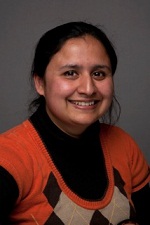 My interest in environmental science and education began with my own experiences in field research environments. There always seemed to be a gap between the caliber of scientific research in environmental science and the level of public understanding about it. This made me curious about what constituted learners’ conceptual understandings about critical science issues and if there were specific tools that could be designed to assess and improve it.
My interest in environmental science and education began with my own experiences in field research environments. There always seemed to be a gap between the caliber of scientific research in environmental science and the level of public understanding about it. This made me curious about what constituted learners’ conceptual understandings about critical science issues and if there were specific tools that could be designed to assess and improve it.
I found myself specifically engaged in the context of Global Climate Change Education. Even though there have been massive efforts to mitigate the effects of global climate change (GCC), the research and practice for promoting climate literacy and understanding of GCC have only recently become a national priority in the U.S. For instance, the National Research Council’s 2012 report, Framework for K-12 Science Education recently emphasized student reasoning, argumentation skills and understanding of GCC and therefore dictates two responsibilities for teachers:
- Foster conceptual clarity in students.
- Promote innovation, resilience, and readiness in students so they can respond to the threat of a changing environment.
Past research in teacher understanding of the science and basics of GCC has shown that in spite of prevalent frameworks such as the Essential Principles for Climate Literacy, teachers continue to struggle in understanding the science behind GCC. Misinformed perceptions about basic climate science content and the role of human activities in the GCC scenario are persistent. Consequently, we need extensive efforts focused on both improving and assessing teachers’ conceptual understanding about the science behind GCC.
My doctoral dissertation, with support of University of Minnesota’s Doctoral Dissertation Fellowship, develops multi-pronged methods that are capable of eliciting a learner’s overall construct of knowledge about GCC. This study, which uses multiple tools for assessment of teachers’ understanding, will also reveal their misconceptions and the gaps in the knowledge of science teachers about GCC. Such information is both novel and critical for science educators in designing materials intended for teachers’ professional development.
The Doctoral Dissertation Fellowship has allowed me to focus all my efforts towards the pursuit of this research, helping me make solid progress while doing high quality work. I am thankful to my adviser Dr. Gillian Roehrig for her guidance and my peers for their support throughout this process. I look forward to completing my project in May 2014 and am preparing for the academic job market in the fall of 2014.
CEHD partners with EMC Publishing to build world language learning environment
Increasing student fluency in world languages and providing educators with innovative technology are the goals of a new partnership between the University of Minnesota’s College of Education and Human Development (CEHD) and EMC Publishing. This collaborative partnership will build EMC Languages, a new online environment for teaching and learning world languages in K-12 classrooms. The partnership between EMC and the CEHD Learning Technologies Media Lab is part of a 10-year exclusive agreement that includes collaborative design and development, K-12 classroom integration and support, and ongoing design-based research.
The goal of this first-of-its-kind partnership is to improve educator effectiveness and student proficiency in the world language arena, since statistics show that only 18 percent of Americans report speaking a language other than English, while 53 percent of Europeans can converse in a second language.
 The EMC Languages online learning environment will include video-based platforms Avenue and Flipgrid, created by the LT Media Lab and proven effective in postsecondary American Sign Language classrooms.
The EMC Languages online learning environment will include video-based platforms Avenue and Flipgrid, created by the LT Media Lab and proven effective in postsecondary American Sign Language classrooms.
EMC Languages builds upon and extends research-based language learning platforms created by the LT Media Lab by leveraging EMC Publishing’s world language instructional content in an easy-to-use environment designed to drive educator effectiveness and student fluency. Students will discover languages and cultures, expand their knowledge beyond the textbook and written test, and perform what they’ve learned to achieve proficiency.
EMC Publishing will pilot EMC Languages in the fall of 2013 and the full environment will be available in early 2014.
“This is a unique partnership for our LT Media Lab and an example of the kind of technology transfer the University is committed to creating,” said CEHD Dean Jean Quam. “We are proud to see our research-based design and development work reaching the marketplace and serving the public good.”
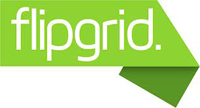 For the past year, EMC and the LT Media Lab have collaborated on the re-design, technology expansion, and K-12 specific development of Avenue and Flipgrid. Avenue allows an educator to conduct a one-to-one assessment of a student’s performance via webcam by creating custom tasks based on EMC’s rich library of curricular media to capture, evaluate, archive, and visualize progress. Flipgrid is a more informal, video-based discussion platform that encourages students to discuss and reflect upon questions and topics sparked by their educator.
For the past year, EMC and the LT Media Lab have collaborated on the re-design, technology expansion, and K-12 specific development of Avenue and Flipgrid. Avenue allows an educator to conduct a one-to-one assessment of a student’s performance via webcam by creating custom tasks based on EMC’s rich library of curricular media to capture, evaluate, archive, and visualize progress. Flipgrid is a more informal, video-based discussion platform that encourages students to discuss and reflect upon questions and topics sparked by their educator.
“EMC Languages is not about simply extending textbooks into an online environment,” said Charles Miller, associate professor in the Department of Curriculum and Instruction and co-director of the LT Media Lab. “Avenue and Flipgrid take educator feedback and classroom collaboration to a new level and give teachers a better way to connect with and earn the trust of their students. It’s all about bringing kids from the back of the class to the front row.”
“As a nation, we face a series of challenges related to our world language deficit. Our focus will be to help world language educators meet these challenges by providing them with a simple and engaging learning environment that’s easy to use and builds student competency,” said Eric Cantor, chairman and chief executive officer of New Mountain Learning. “The future of fluency depends on motivating students to practice and perform, and to learn in ways that transcend vocabulary words and verb conjugation. The long-term goal of our partnership is to keep students engaged in world languages beyond the basic requirements.”
EMC Languages will be intuitive and flexible and fully integrated to flow with any approved curriculum. Educators can subscribe to the entire suite or only those elements most relevant to their classrooms. The platforms are simple to use, enabling an educator and student to create and complete a task in three minutes.
For more information, visit www.emcl.com.
Read the Star Tribune/Associated Press story.
Prepare2Inspire at the STEM Education Center
Check out an article from the MN Daily about Lesa Clarkson and her new project, Prepare2Inspire! Congratulations to Lesa for her great accomplishment.
http://www.mndaily.com/news/campus/2013/06/17/u-gets-funds-new-math-education-program
A Voice for Immersion Education
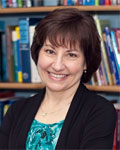 This month, C&I’s Diane Tedick, Associate Professor in Second Languages and Cultures, has been tapped by a California community for her expertise in dual language and immersion education. A group of parents and educators in Orange County’s Little Saigon neighborhood are advocating for the state’s first Vietnamese-English dual immersion program. Tedick supports this kind of initiative citing powerful benefits of biliteracy including better performance in English, as well as other subjects.
This month, C&I’s Diane Tedick, Associate Professor in Second Languages and Cultures, has been tapped by a California community for her expertise in dual language and immersion education. A group of parents and educators in Orange County’s Little Saigon neighborhood are advocating for the state’s first Vietnamese-English dual immersion program. Tedick supports this kind of initiative citing powerful benefits of biliteracy including better performance in English, as well as other subjects.
However, not everyone in the community sees the proposal for a Vietnamese-English immersion program in a favorable light. In May, Jim Tortolano, a journalist in California, and editor and publisher of the Garden Grove Journal, posted an editorial on the possible political reasons for pursuing a Vietnamese-English dual immersion program. In an article titled “Jim Tortolano’s Retorts: ‘Immersion’ or segregation?”, he expresses skepticism for the educational benefits of immersion programs and some reservations for the cost.
He questions, “And where does it all end? Will we have immersion programs in Spanish, Korean and Arabic soon after? I suppose we will if the votes are there, regardless of the absence of any apparent educational benefit. What, also, about the cost? You’d have to buy books in every subject in the foreign language. Are there many calculus or U.S. history textbooks in Vietnamese? Can we afford to hire dozens, perhaps hundreds of teachers because they have that fluency?”
This month, Tedick authored a response to Tortolano’s concerns and addressed some misinformed beliefs commonly held about immersion programs. In “Immersion programs are a good idea” Tedick states: “In high quality two-way programs, ELs achieve at levels that are comparable or superior to their [English Learner] peers’ in the same school district and state. In fact, ELs who attend two-way programs and are eventually reclassified by state criteria as proficient in English on average tend to do even better than native English speakers being schooled only in English on measures of reading/language arts and math achievement. Two-way programs are the most effective program model we have today when it comes to teaching ELs.”
Tedick also addresses concerns over cost, cultural assimilation and segregation. Read Diane Tedick’s full editorial at ggjournal.com.
McNair Scholars announced
The McNair Scholars program is pleased to announce its new cohort. This summer 20 students from the University of Minnesota Twin Cities and Crookston campuses, Carleton College, and University of St. Thomas are conducting research under the direction of distinguished university faculty research mentors and attending graduate school preparation seminars. Six CEHD students are scholars and five CEHD faculty are serving as mentors: Shonda Craft (family social science), Ann Masten (child development), Priscilla Gibson (SSW), Bob Poch (postsecondary teaching and learning), and Catherine Solheim (family social science).
Please hold the date for the Twenty-First Annual Poster Presentation and Reception for student participants and their faculty mentors on Thursday, Aug. 1, 2-4 p.m., at Coffman Memorial Union. This gathering will provide an excellent forum to display the research efforts of these exceptional McNair Scholars and their University of Minnesota faculty mentors. In addition, the reception will provide the opportunity to thank individuals who have wholeheartedly contributed time and effort to make the McNair program a success at the University of Minnesota.
Induction Forum
Transition to Teaching Coordinator, Tiffany Moore, kicked off the collaborative induction work beginning with the forum in June. TERI faculty and staff participated in an Induction Forum with representatives from our partner districts (Brooklyn Center, Columbia Heights, Forest Lake, Minneapolis, St. Paul, White Bear Lake) and partner universities (Augsburg, Bethel, Concordia, Hamline, St. Catherines. St. Thomas). At the forum, each institution set goals for induction work this year.
C&I’s Lori Helman quoted in MPR story on Common Core Standards
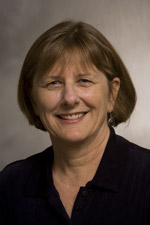 Minnesota recently joined a national trend to adopt Common Core standards to improve student knowledge in reading. The new standards will progressively make student readings more sophisticated as they move through grades. These new standards come with new assessments implemented just this spring in the Minnesota Comprehensive Assessment tests (MCAs).
Minnesota recently joined a national trend to adopt Common Core standards to improve student knowledge in reading. The new standards will progressively make student readings more sophisticated as they move through grades. These new standards come with new assessments implemented just this spring in the Minnesota Comprehensive Assessment tests (MCAs).
In an MPR story covering what the Common Core standards will mean for Minnesota, Curriculum and Instruction Associate Professor Lori Helman says, “The Common Core standards really take us to a higher level in terms of comprehension.”
Listen to the full story at mpr.org.
Tedick Featured in Dual Language Immersion Story
 This week, C&I Associate Professor Diane Tedick, Second Languages and Cultures, was featured in a Voice of OC article on a proposal for a new Vietnamese language immersion program.
This week, C&I Associate Professor Diane Tedick, Second Languages and Cultures, was featured in a Voice of OC article on a proposal for a new Vietnamese language immersion program.
A 2006 study found that the local Vietnamese community in Southern California may be losing its language. The study showed that this language loss is occurring in one to two generations, among the shortest in time frame of all the groups studied. That is why a group of Vietnamese parents are petitioning for the state’s first Vietnamese-English dual immersion program.
Tedick weighed in on the benefits of bi-literacy citing five decades of research. From the article:
“Consider,” Tedick said, “that while nationwide the dropout rates for Latino students are higher than for other ethnic groups, studies show that Latinos in two-way programs have more positive attitudes toward school, say good grades are important, want to go to college and believe a good education will lead to a better life.”
Read the full article on voiceofoc.org.
Sullivan awarded Lightner Witmer Award
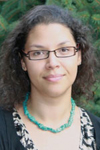 Amanda Sullivan, assistant professor in the Department of Educational Psychology (School Psychology), received the 2013 Lightner Witmer Award from Division 16 of the American Psychological Association. This prestigious award recognizes individuals who are within seven years of receiving their degree and who have demonstrated continuous scholarship that merits special recognition.
Amanda Sullivan, assistant professor in the Department of Educational Psychology (School Psychology), received the 2013 Lightner Witmer Award from Division 16 of the American Psychological Association. This prestigious award recognizes individuals who are within seven years of receiving their degree and who have demonstrated continuous scholarship that merits special recognition.
CEHD programs win College Ready grants to support local, underserved students
The University of Minnesota STEM Education Center is a recipient of a College Ready grant from the Great Lakes Higher Education Guaranty Corporation, which will provide mathematics tutors/mentors to 135 eighth and eleventh graders in Minneapolis during the 2013-14 academic year. The $300,000 award will support the Prepare2Nspire program, which prepares underserved students to succeed on grade-level, high-stakes mathematics exams and to inspire them to continue their study of mathematics.
Prepare2Nspire is an innovative, cascading, multi-grade mathematics tutoring and mentoring opportunity that will include graphing calculator technology.
 Principal Investigator Dr. Lesa Covington Clarkson, associate professor, has a history of working in urban schools with diverse populations in the Twin Cities. “Too often, underrepresented students aren’t served in our urban classrooms,” she said. “This program will provide additional time and tools to support students in their mathematics learning.”
Principal Investigator Dr. Lesa Covington Clarkson, associate professor, has a history of working in urban schools with diverse populations in the Twin Cities. “Too often, underrepresented students aren’t served in our urban classrooms,” she said. “This program will provide additional time and tools to support students in their mathematics learning.”
As university undergraduate students will be tutoring and mentoring eleventh grade algebra 2 students in the program, the eleventh grade cohort will be tutoring and mentoring eighth grade algebra students. Graphing calculator technology will support students’ development of algebraic thinking and their preparation for postsecondary study.
Every student profits from this model, according Clarkson. Tutors are developing mathematics communication and reasoning skills as they explain content in which they were recently engaged and at the same time they are developing roots in mathematics that are fundamental to their current study. Middle school participants are receiving individualized tutoring and mentoring services designed to meet their unique challenges in the mathematics content studied. Simultaneously, grade-level skills will be continually addressed through mini lessons at weekly meetings.
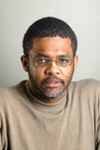 The University’s ACT/SAT Review Program also received an award of $21,721 to help 180 high school students through a 10-week ACT review program. Led by Ernest Davenport, associate professor in the Department of Educational Psychology, the program addresses test-taking and other issues for academically at-risk students. It’s been offered for more than 20 years.
The University’s ACT/SAT Review Program also received an award of $21,721 to help 180 high school students through a 10-week ACT review program. Led by Ernest Davenport, associate professor in the Department of Educational Psychology, the program addresses test-taking and other issues for academically at-risk students. It’s been offered for more than 20 years.
The Great Lakes Higher Education Guaranty Corporation awarded more than $4 million in May to 34 student-centered programs that will serve nearly 4,000 students in Minnesota and Wisconsin in grades 6 through 12 and adult learners. Each program is actively preparing more students to succeed academically, enroll in college, and then succeed in college-level coursework.
Part of the College of Education and Human Development (CEHD), the STEM Education Center includes researchers from five U of M colleges, with core faculty from CEHD’s Department of Curriculum and Instruction.
Read the Minnesota Daily story on Prepare2Nspire.
C&I Alumni Spotlight: Christina Thuli
We recently heard an update from one of our initial teaching licensure alumni, and we thought we’d share her story. Christina Thuli was one of our outstanding ESL teacher candidates who graduated from the Second Languages and Cultures Education program in 2010. She moved to New York City to pursue her teaching career but she maintains her strong connection to our program. Read her story below.
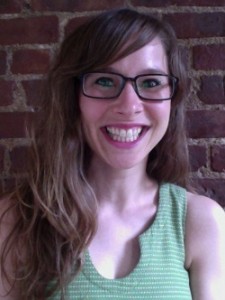 I distinctly remember waiting for a train in India, when a boy asked if he could shine my shoes. I smiled because my shoes were filthy, but they were also cross-trainers, and I was sure his cloth would only rub around the dirt. However, he looked so eager to shine them that I couldn’t resist. “Of course,” I said, and as he began his work, a man in a well-tailored business suit slid over to sit beside me. “He would do anything to be in those shoes,” he said, “…to go all the places you’ve been.”
I distinctly remember waiting for a train in India, when a boy asked if he could shine my shoes. I smiled because my shoes were filthy, but they were also cross-trainers, and I was sure his cloth would only rub around the dirt. However, he looked so eager to shine them that I couldn’t resist. “Of course,” I said, and as he began his work, a man in a well-tailored business suit slid over to sit beside me. “He would do anything to be in those shoes,” he said, “…to go all the places you’ve been.”
His comment spoke as a metaphor for the past year of my life. I had taken time off from my undergraduate degree at UW-Madison and was nearing the end of my year long trip around the world. The sudden chills that ran down my spine at his comment were all too familiar. I recalled the voices of the Nepalese children from the school in which I’d taught in Kathmandu. “Ms., will we learn English every day?” they’d ask with vehement enthusiasm, desirous to learn as much as possible. The mornings in the orphanage flashed almost simultaneously through my mind. “You’ll teach us English?” the children would ask as they gobbled dal bhat before school. As I reflected on these experiences and thought about what the man in the business suit had said, I realized that I had not only fallen in love with all of the places I’d been, but rather than quenching my traveling thirst, my journey had ignited a fervid desire to forever be a part of this cultural exchange.
Upon returning to university, I changed my major to Spanish Language and Culture, studying abroad in Chile and volunteering to teach English in a public elementary school. I then moved to New York City to teach, and soon it became clear to me. Just as in India, I realized that as much as I loved experiencing different languages and cultures, it was sharing it with others that made me the most passionate. I wanted to be a teacher.
My decision to complete the Second Languages and Cultures Program at the University of Minnesota could have not have been more fitting. The model that the university promotes–teaching students English through culturally relevant, content-based instruction–thoroughly resonated with me. The rigor and progressive educational model of this program also gave me confidence to teach English Language Learners at any level. For the past three years, I have used this model to teach ESL at a charter school in the Bronx, where I also co-advise the student council.
I have recently accepted a position as the ELL specialist at East Harlem Scholars Academy II, a founding charter school in East Harlem that focuses on ELLs. The integrity of the ELL program at its sister school–East Harlem Scholars Academy– immediately struck a chord with me. I soon learned that the ELL specialist at this school also completed the Second Languages and Cultures Program at Minnesota! I could not be more excited to begin my new work, helping to create a program from the ground up for English Language Learners, with an emphasis on family involvement and holistic education.
Thinking back to the boy who wanted to shine my shoes in India, I truly believe I’ve found my calling to help children like him “go all the places [I’ve] been.” As a teacher of languages, I am forever committed to helping create opportunities for people, such as the boy in India, who may otherwise have gone denied. In the future, I hope to travel and write children’s books, combining my love of culture, language and travel with meaningful education and engaging literacy that will push students forward and give them the opportunities they deserve.
Attention! 2013 STEM Colloquium Abstracts due TODAY!
Interested in presenting at an international conference on STEM Education Research to Practice? Complete the abstract subission form and email to stemcoll@umn.edu. The subject line should be “2013 STEM Colloquium Abstract Submission”
Abstracts are due no later than 5pm TODAY!
The 2013 Colloquium on P-12 STEM Education Research is a hands-on, experiential, colloquium that involves attendees throughout breakout sessions and educates through active learning. STEM Education is the focus of this Colloquium, and preference will be given to sessions that focus on two or more area of STEM, or STEM integration with another discipline.
NCATE awards highest distinction, renewed accreditation to CEHD teacher education programs
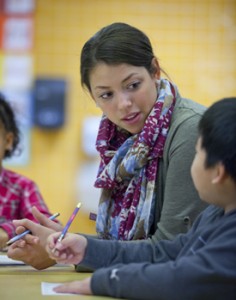 The University of Minnesota’s College of Education and Human Development (CEHD) has been awarded the highest standard of accreditation and was recognized for exemplary performance in its partnership with local schools by the National Council for Accreditation of Teacher Education (NCATE).
The University of Minnesota’s College of Education and Human Development (CEHD) has been awarded the highest standard of accreditation and was recognized for exemplary performance in its partnership with local schools by the National Council for Accreditation of Teacher Education (NCATE).
“NCATE’s accreditation renewal for the university, which extends through 2019, recognizes CEHD’s high quality preparation of teacher candidates and other school professionals,” said CEHD Dean Jean Quam.
“This recognition means a great deal to us and to our teacher candidates,” she said. “We voluntarily pursue national accreditation, as it is not a state or national requirement, because we value the assessment of the quality of our programs against a set of very rigorous national standards and by our peers and P-12 school practitioners.”
The university recommends Minnesota teaching licensure for about 300 teachers each year, most of whom remain in the state. CEHD works with several school partners in Minnesota to develop highly qualified teachers through its Teacher Education Redesign Initiative (TERI), which is supported by the Bush Foundation’s Network for Excellence in Teaching (NExT). One of TERI’s hallmarks is collaboration with local districts to prepare teachers focused on reducing disparities in student achievement.
“We have strong clinical programs, and our school district partners rely on us to provide prepared and innovative student teachers,” said TERI director Misty Sato. “When we started TERI, we had closing the achievement gap as number one on our list of long-term goals. That includes diversifying our teaching profession and preparing teachers who are more culturally responsive. We are beginning to see results — the diversity of the candidate pool has increased over the past 3 years and employers of CEHD-prepared teachers report on surveys that these teachers effectively teach students from culturally and ethnically diverse backgrounds.”
Quam agrees that data collected by the college indicates a positive trend. “We are attracting a very talented pool of teacher candidates,” she said. “They are academically strong, many have had international experiences, and they express a long-term commitment to teaching that is focused on equity and student achievement.”
NCATE, which is recognized by the U.S. Department of Education as a specialized accrediting body, identified the U of M’s field experiences and clinical practice for distinction. All U of M teacher candidates have clinical experiences that include numerous opportunities to design instruction that supports student learning in diverse classrooms, analyze student assessment data, and engage with other school professionals.
Roosevelt High School- CEHD Professional Development School (PDS) Partnership in Minneapolis Public Schools featured in Connect
Commencement ceremonies honor CEHD graduates
 More than 550 undergraduates and 430 graduate students were honored in CEHD commencement ceremonies May 16.
More than 550 undergraduates and 430 graduate students were honored in CEHD commencement ceremonies May 16.
Quincy Lewis (see photo), associate development officer for the Golden Gopher Fund, received his M.Ed. during the graduate ceremony in the afternoon and gave the commencement address at the undergraduate ceremony in the evening.
Youth studies graduate Xue Xiong gave the student address to her fellow undergraduates.
See more photos in the slideshow at CEHD Commencement.
Photo by Greg Helgeson
Devarati Bhattacharya- Recipient of the 2013-2014 Doctoral Dissertation Fellowship
Congratulations to STEM Graduate Research Assistant, Devarati Bhattacharya, for receiving the 2013-2014 Doctoral Dissertation Fellowship. The fellowship is intended to enable Ph.D. candidates of particular promise to devote full-time effort to the research and writing of their dissertation during the 2013-14 academic year. The fellowship includes a travel grant for Fellows invited to present work at a national or international conference. Fellows are also encouraged to attend monthly DDF seminars and the annual poster session.
Creating a Culture of Evidence: Data Sharing in School-University Partnerships
We were pleased on this day to co-host a collaborative event with Minneapolis Public Schools, the Twin Cities Teacher Collaborative of private universities (Augsburg, Bethel, Concordia-St. Paul, Hamline, St. Catherine, and St. Thomas), the Urban Leadership Academy, and the Value-Added Research Center.
Over 135 people attended the event. We:
- heard from national and regional experts about teacher evaluation across the professional continuum
- learned about teacher evaluation in the context of school-university partnerships
- deepened our understanding of supports for probationary teachers in Minneapolis Public Schools (MPS)
- learned from MPS and Institutions of Higher Education (IHE) data sharing
- discussed probationary teacher successes and challenges informing teacher preparation
A cross-representative data team with members from MPS district and university partners worked together to provide data for all to review.
Minneapolis Public Schools presented aggregated and de-identified data from their comprehensive teacher evaluation system, including draft reports generated from the following assessments:
- Standards of Effective Instruction (SOEI) observations results
- P-12 Student Survey results
- Value Added results
Institutions of Higher Education (IHE) Teacher Preparation presented aggregated and de-identified draft reports with aggregated data from the Common Metrics, surveys used by NExT institutions to collect information from students at entry, exit, and one year after employment.
The Value-Added Research Center also presented reports to each district partner for review.
Participants heard directly from Human Resource administrators, economists, principals, school-university liaisons, partnership coordinators, university faculty, first year teachers, and district mentors. It was an event not to be missed! See agenda.pdf
Bernadeia Johnson, Superintendent of Minneapolis Public Schools, welcomed nearly 135 participants to the May 17, 2013 Creating a Culture of Evidence: Data Sharing in School-University Partnerships Event.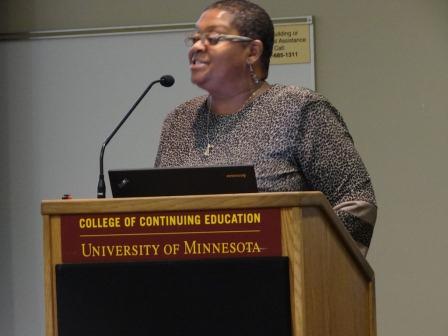
Linda Darling-Hammond, Charles Ducommun Professor of Education &
Co-Director School Redesign Network (SRN), presented on Teacher Evaluation Across the Professional Continuum: Building Systems that Support Professional Growth and Leadership.